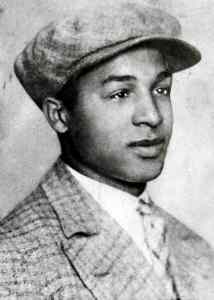Hilarius Gilges
Hilarius Gilges (IPA German hɪˈleərɪəs gɪl:gɛs), (April 28, 1909, Düsseldorf – June 20, 1933), known as "Lari" Gilges, was an Afro-German actor and communist. He was murdered at the age of 24 by the Nazis.

Life
Hilarius Gilges was one of the few black Germans born in the country before the First World War. His mother Maria Stüttgen was a textile worker in Düsseldorf; the origin of his biological father is not known for certain, but he was probably an African boatman working on a Rhine tugboat. Maria married Franz Peter Gilges in 1915, giving the boy the family name Gilges.
Gilges grew up in the working class milieu of Düsseldorf and joined German Communist Youth in about 1925 or 1926.[1] He became an amateur actor with the communist agitprop theatre group "Nordwest ran" directed by Wolfgang Langhoff. His radical politics led in 1931 to his arrest and sentencing to one year in prison. After his release in 1932 he continued as an active communist agitator.
Gilges married Katharina Hubertine Laatsch (born Vogels) and fathered two children.
Death
In early 1933, after the Nazis seized power, he attempted to go into hiding, but his visibility due to his skin color made this difficult. In June 1933, he was kidnapped from his apartment in the city's Altstadt district (Old Town) district of Düsseldorf. He was then brutally tortured and killed. The perpetrators are believed to have been six members of the Gestapo and SS, but even after the end of Nazi rule, were not tried in court.[1]
His widow and two children survived the Nazi period, probably because they were helped by neighbors in the Altstadt. In 1949 they were given a lump sum compensation of 12,000 Deutschmark as restitution.
Commemorations
On 23 December 2003 the city of Düsseldorf named a plaza after Hilarius Gilges, in the vicinity of the Düsseldorf Academy of Arts. In 1988 a plaque had been already placed at the approximate site of the murder. The plaque was commissioned by the Düsseldorf city museum and designed by the local artist Hannelore Köhler. It shows a relief profile of Gilges.
References
- Clarence Lusane: The Historical Experiences of Afro-Germans, European Blacks, Africans, and African Americans in the Nazi Era. Routledge, London 2002, ISBN 0-415-93121-5,
- Lothar Pützstück: „AfrikanerInnen in Deutschland und schwarze Deutsche – Geschichte und Gegenwart. Beiträge zur gleichnamigen Konferenz vom 13.-15. Juni 2003 im NS-Dokumentationszentrum Köln“. In: Marianne Bechhhaus-Gerst, Reinhard Klein-Arendt (Hrsg.): Begegnungen. Geschichte und Gegenwart der afriknisch-europäischen Begegnung. LIT Verlag, Münster 2004.
Notes
- "Todestag des Hilarius Gilges (in german)". Archived from the original on 2011-07-19. Retrieved 2010-06-08.